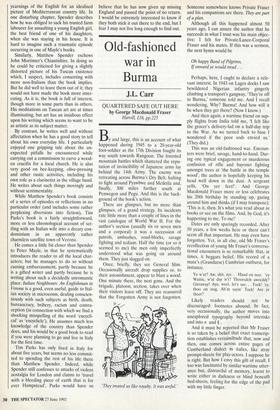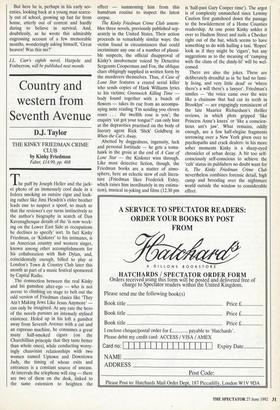Old-fashioned war in Burma
J.L. Carr
QUARTERED SAFE OUT HERE by George Macdonald Fraser
Harvill, fI6, pp.225
By and large, this is an account of what happened during 1945 to a 20-year-old foot-soldier as the 17th Division fought its way south towards Rangoon. The forested mountain battles which shattered the repu- tation of invincibility of Japanese arms lay behind the 14th Army. The enemy was retreating across Burma's Dry Belt, halting to fight around Pyawbwe and Meiktila and, finally, 300 miles further south at Penwegon and Pegu. And this is the back- ground of the book's action.
There are glimpses, but no more than glimpses, of a grand strategy. Its incidents rate little more than a couple of lines in the vast catalogue of World War II. For the author's section (usually six or seven men and a corporal) it was a succession of patrols, ambushes, road-blocks, savage fighting and tedium. Half the time (or so it seemed to me) the men only imperfectly understood what was going on around them. They just slogged on.
Once, briefly, they see General Slim. Occasionally aircraft drop supplies or, to their astonishment, appear to blast a wood. One minute there, the next gone. And the brigade, platoon, section, takes over when their visitors leave off. They are reassured that the Forgotten Army is not forgotten.
'They treated us like royalty. It was awful.' Someone somewhere knows Private Fraser and his companions are there. They are part of a plan.
Although all this happened almost 50 years ago, I can assure the author that he succeeds in what I trust was his main objec- tive: I felt for Private/Lance-Corporal Fraser and his mates. If this was a sermon, the next hymn would be Oh happy Band of Pilgrims, If onward ye would tread . . .
Perhaps, here, I ought to declare a rele- vant interest. In 1943 on Lagos docks I saw bewildered Nigerian infantry gingerly climbing a transport's gangway. 'They're off to Burma,' someone told me. And I recall wondering, Why? Burma! And how will it be when they get there? (Now I know.) And then again, a wartime friend on sup- ply flights from India told me, 'I felt like the grocer's delivery-lad on a half-day trip to the War. As we turned back to base I wondered if the poor sods envied us.' (They did.) This was an old-fashioned war. Encoun- ters were brief, savage, hand-to-hand. Dur- ing one typical engagement or murderous confusion of rifle and bayonet fighting amongst trees at 'the battle in the temple wood', the author is hopefully keeping his head well down in the dust. A sergeant yells, 'On yer feet!'. And George Macdonald Fraser more or less celebrates his 20th birthday by standing up, gazing around him and thinks (if I may transpose): `This is it, then. It's what you read about in books or see on the films. And, by God, it's happening to me. To me!'
Dates are only sparingly recorded. After 50 years, a few weeks here or there can't seem all that important. He may even have forgotten. Yet, in all else, old Mr Fraser's recollection of young Mr Fraser's conversa- tional encounters is so remarkable that, at times, it beggars belief. His record of a mate's (Grandarse) Cumbrian outburst, for instance, Ye w'at? Aw, shit, aye. .. Hand on noo. 'ey Wattie, w'at day is't? Thoorsdeh awreddy? Girraway! Aye, wee!, let's sec. . . Tock! 'ey, thoo on stag, Ah'm sayin' Tock! Are ye theer?
Likely readers should not be discouraged: footnotes abound. In fact, very occasionally, the author moves into unexplored typography beyond asterisks and into * and § .
And it must be reported that Mr Fraser is so taken by a belief that exact transcrip- tion establishes vertsimiltude that, now and then, one comes across entire pages of Cumberland dialect in italics, like stray prompt-sheets for play-actors. I suppose he is right. But how I envy this gift of recall. I too was fascinated by similar wartime utter- ance but, distrustful of memory, learnt to write either in darkness or blind beneath bed-sheets, feeling for the edge of the pad with my little finger. But here he is, perhaps in his early sev- enties, looking back at a young man scarce- ly out of school, growing up fast far from home, utterly out of context and hardly daring to believe in survival. And, doubtlessly, as he wrote this admirably engrossing account of a few memorable months, wonderingly asking himself, 'Great heaven! Was this me?'
J.L. Carr's eighth novel, Harpole and Foxberrow, will be published next month.



















































 Previous page
Previous page